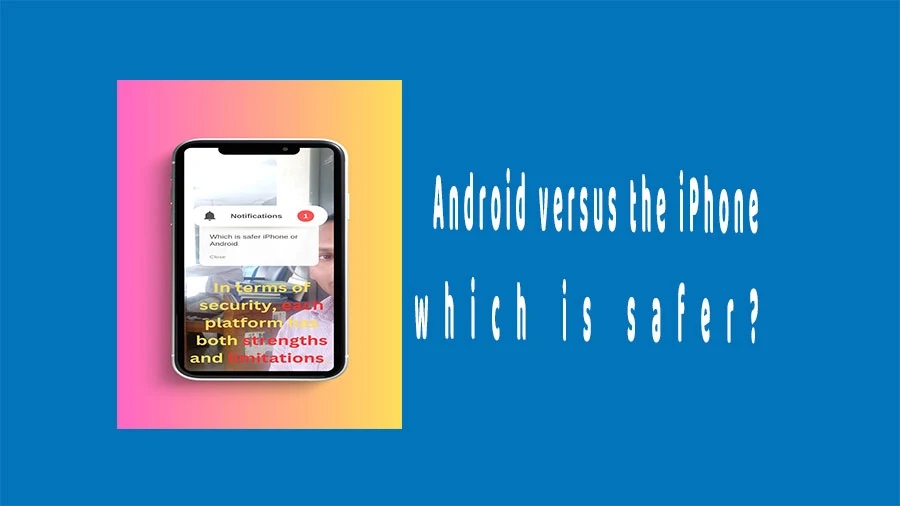Android versus the iPhone, which is safer
The debate between iPhone and Android security has been going on for years. In terms of security, each platform has both strengths and limitations. However, in this blog post, we will dive deeper into the factors that make one platform more secure than another. We'll look at the security features of both platforms,
The level of control users have over their data, the number of vulnerabilities and threats on each platform, and the policies of the companies behind the platforms.
Index of Posts
- Security Features
- Control over data
- Vulnerabilities and Threats
- Company Policy
- Malware and security threats
- Conclusion
Security Features
In terms of security features, both iPhone and Android have come a long way. In recent years, both platforms have introduced features such as biometric authentication, app permissions, and encrypted messaging. However, there are some differences in the security features offered by both the platforms. Apple's iOS has a reputation for being more secure than Android, and this is largely due to the closed nature of the platform. Apple controls every aspect of the iOS ecosystem, from hardware to software, making it easy to ensure platform security. iOS also has features like Face ID, which uses 3D depth mapping to create a secure facial recognition system that's hard to trick.
On the other hand, the open nature of Android means it is more vulnerable to security threats. However, the platform has introduced several security features such as Google Play Protect, which scans apps for malware before they are installed, and Android Device Manager, which allows users to remotely locate, lock and wipe their device. Android allows users to use biometric authentication, such as fingerprint recognition, for added security.
Control over data
When it comes to data control, Android offers more flexibility than iOS. Android users have more control over what data apps can access and can even install apps from third-party sources. However, this flexibility comes at a cost, as it makes Android more vulnerable to malware. On the other hand, Apple's closed nature means that iOS users have less control over their data. Apple is known for its strict App Store policies and only allows apps that meet its strict guidelines. This approach has made the iOS App Store one of the safest app stores with less incidence of malware.
Vulnerabilities and Threats
Both iOS and Android are vulnerable to security threats, but the frequency and severity of these threats varies between the two platforms. iOS has a reputation for being more secure, and that's partly because it's less popular than Android. Hackers are more likely to target platforms with a larger user base, making Android a more attractive target. However, the open nature of Android means it is more vulnerable to malware. Android users can download apps from third-party sources, which can introduce malware to the device. This is not possible on iOS, as apps can only be downloaded from the official app store.
Company Policy
The policies of the companies behind the platforms can also affect their security. Apple is known for its strict App Store policies, which help keep the iOS App Store safe. The company also has a history of fighting for users' privacy, with its CEO, Tim Cook, famously refusing to unlock an iPhone for the FBI in 2016. Google, on the other hand, has a more open approach to data. The company collects large amounts of user data to improve its services and has been criticized for its data collection practices in the past. However, the company has also introduced several security features like Google Play Protect on its Android platform.
Malware and security threats
When it comes to choosing between iPhone and Android, it ultimately comes down to your personal preferences and priorities. If security is your top priority, then iOS might be a good choice for you. However, if you value flexibility and control over your data, Android may be a better option. Regardless of the platform you choose, there are several steps you can take to improve your device's security. Here are some tips:
- Keep your device updated: Both iOS and Android release regular security updates to fix vulnerabilities. Make sure to keep your device updated to ensure you have the latest security patches.
- Use strong passwords and biometric authentication: Use a strong password or biometric authentication (such as fingerprint or facial recognition) to prevent unauthorized access to your device.
- Beware of third-party apps: Only download apps from trusted sources like official app stores. Beware of apps that ask for unnecessary permissions or access to your data.
- Use a VPN: If you regularly use public Wi-Fi Both iPhone and Android have made significant strides in improving their security features in recent years. While there may be some differences between the two platforms, ultimately, the safety of your device depends on your own actions and the precautions you take. By following these tips and staying vigilant, you can ensure your device remains secure, regardless of which platform you choose.
Conclusion
So, which is safer, iPhone or Android? The answer is not straightforward. Apple's closed nature makes iOS more secure, but it also limits user control over data. Android's open nature allows for more flexibility, but it also makes it more vulnerable to.









কাজীআরিফুল ডট কমে নীতিমালা মেনে কমেন্ট করুন। প্রতিটি কমেন্ট রিভিউ করা হয়।
comment url